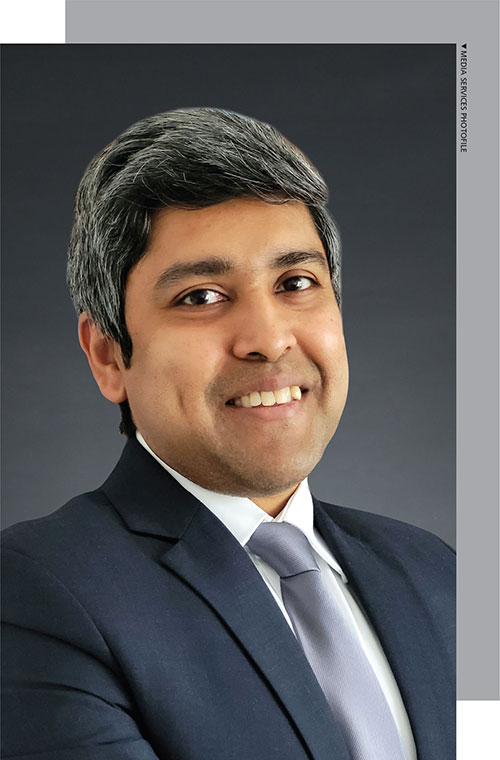Dr. Lavindra de Silva
Translating theory into practice

Q: What inspired you to become a computer scientist?
A: Growing up, my parents were role models for hard work and perseverance, which were the driving forces behind my PhD. They also purchased a PC for me when I was 10, which got me into programming.
Among my first programmes was in fact an AI chatbot (though it couldn’t withstand my younger brother’s relentless prompting).
My father taught us maths and physics, and I could pick his brain all the way to my A-Levels. As a senior Emirates engineer, I saw him work methodically and meticulously – the essence of the scientific method. This inspired my career.
Q: And what drew you to the field of digital manufacturing and construction?
A: Manufacturing and construction are major contributors to the UK’s GDP, and the rising demand to digitalise these sectors was enticing.
Through an earlier project at Cambridge, we helped manufacturing SMEs digitalise; and they reported benefits including process optimisation and planning effectiveness so the project produced a spinoff.
Currently, I’m a director of a GBP 15 million digitalisation initiative to make roads safer and greener, involving 50 researchers and 25 businesses.
These projects have meant transitioning into a research and thought leadership role, and diversifying into areas including data science.
Q: Have you had any opportunities to collaborate with researchers or institutions in Sri Lanka?
A: Not yet in my field but my interest in Buddhist-Christian dialogue – due to my grandfather’s (the late Rev. Dr. Lynn de Silva) pioneering work – triggered a collaboration with the Ecumenical Institute for Study and Dialogue (Colombo).
Years of collaboration with the former administrative secretary produced a comprehensive record of my grandfather’s work, contributing to later writings, and conferences in Germany and Sri Lanka that commemorated his centenary.
Q: What advice would you offer to aspiring researchers or entrepreneurs in Sri Lanka who are looking to make their mark on the world stage?
A: Focus on high quality non-trivial work. This isn’t easy in the current academic environment – I’ve certainly felt pressured to let some papers be published even when I didn’t consider them to be particularly significant.
Academia nowadays is a numbers game: what seems to matter is the number of publications, citations, funding and so on. This pressures academics to be less detail oriented or preoccupied with tackling many ‘tips of icebergs’ rather than taking a deep dive and conquering one ‘iceberg’ in its entirety.
One indicator of quality is research published in venues such as Nature. There are only few such venues in any field and in AI, it has an ‘A*’ (Computing Research and Education Association of Australasia or CORE) ranking.
Q: How do you adapt to and navigate different cultural and business etiquettes in the countries you operate in?
A: I’m fortunate to have lived in five countries, and mingled with both locals and immigrants from diverse parts of the world. I have developed an appreciation for varied beliefs and practices, and learnt that there are many ‘correct’ ways to do things.
Etiquettes certainly varied; an open mind and some tolerance was crucial. Moving to Dubai was a brutal introduction to immigrant life and on moving to Melbourne, I was shocked to see professors in shorts and slippers.
France had further surprises – dressing up was paramount and work colleagues greeted each other with a kiss. The quality of life was great though: impressive lunches (and wine!) at work and 48 days of leave.
Unsurprisingly, I’m more productive in the UK (despite the mediocre lunches).

Q: And how do you stay updated on the latest advancements in your field and decide which avenues of research to pursue?
A: I’m regularly on committees that critique papers before publication, which gives me a sneak peek at upcoming research.
I try to take big strides from the state-of-the-art – for example, my theory of multiprocessor concurrency for the popular ‘belief-desire-intention’ family of autonomous systems addressed a problem that was open for decades.
Q: Reflecting on your career thus far, what do you consider to be your most significant contributions to the field?
A: My main contribution is challenging problems with theory and transferring it into practice.
My PhD produced novel mathematical models for AI-based planning in belief-desire-intention systems, which contributed to extending a simulator owned by the Australian Defence Science and Technology Group, and developing the fastest hierarchical AI planning tool, which won the prestigious International Planning Competition.
And my work on robot verification at the French National Centre for Scientific Research was theoretical but produced a tool and extension that was successfully trialled on a driver-less minibus.
Further theory on verification led to demonstrations on practical manufacturing facilities and a demonstration award.
Going forward, I’d like to build AI for social good.
I have developed an appreciation for varied beliefs and practices, and learnt that there are many ‘correct’ ways to do things
FACT FILE
FAMILY
Father – Lahan
Mother – Peace
Brother – Lasantha
Wife – Kim
Children – Koen and Luca
SCHOOLING
S. Thomas’ Preparatory School
Grammar School (Dubai)
St. Mary’s Catholic High School (Dubai)
QUALIFICATIONS
BSc (Hons) in Computer Science (Australia)
PhD in Artificial Intelligence (Australia)
PRESENT OCCUPATION
Research (Full) Professor
COUNTRY OF RESIDENCE
UK
CITY OF RESIDENCE
Cambridge
CV IN A NUTSHELL
Dr. Lavindra de Silva is a Research Professor at Cambridge University. He is accomplished in theoretical computer science and transferring theory into practice.
He has collaborated widely and spearheaded publications in leading venues in engineering and computer science, and helped build numerous systems that were either supplied or showcased to UK manufacturing SMEs, and organisations including the Defence Science and Technology Group (Australia), Her Majesty’s Government Communications Centre (UK), National Highways (UK) and the European Space Agency.
Projects co-led by de Silva have resulted in spinoff companies, as well as BBC, French and other media coverage.
